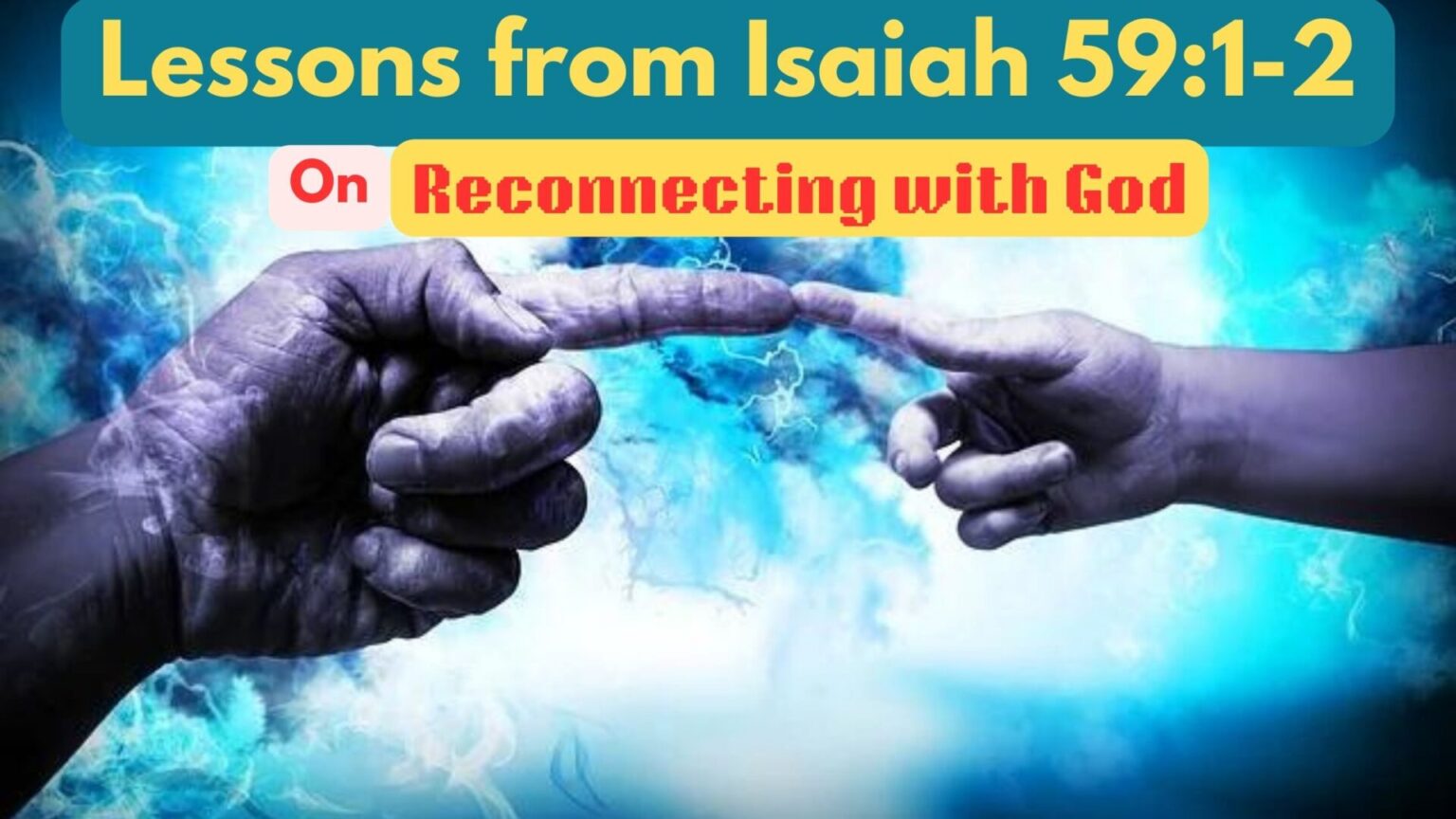Introduction:
Restoring Harmony: Lessons from Isaiah 59:1-2 on Reconnecting with God

In a world filled with distractions and chaos, finding harmony and reconnecting with our spiritual selves can often feel like an uphill battle. Yet, amidst the noise, ancient texts like the Bible offer timeless wisdom and guidance. Isaiah 59:1-2 provides profound insights into the process of restoring harmony and reconnecting with God. Let’s delve into this passage and explore the valuable lessons it holds for us today.
Understanding the Context: Before delving into the specifics of Isaiah 59:1-2, it’s crucial to understand the broader context of the book of Isaiah. Isaiah was a prophet who ministered to the nation of Judah during a period of political turmoil and moral decay. The people had strayed from God’s ways, leading to societal unrest and spiritual distance.
Isaiah 59:1-2 reads:
“Behold, the Lord’s hand is not shortened, that it cannot save, or his ear dull, that it cannot hear; but your iniquities have made a separation between you and your God, and your sins have hidden his face from you so that he does not hear.”
Lessons for Restoring Harmony:
- The Unchanging Nature of God: The passage begins by affirming the omnipotence and omniscience of God. It emphasizes that God’s ability to save and hear prayers is not limited by any external factors. This serves as a reminder that, despite our circumstances, God remains constant and faithful.
- Identifying the Barrier: The heart of the passage lies in the recognition of the barrier between humanity and God. It attributes this separation not to any deficiency on God’s part but to the iniquities and sins of the people. This highlights the importance of self-awareness and accountability in spiritual restoration.
- The Consequence of Sin: Sin not only damages our relationship with God but also obscures His presence in our lives. When we choose to walk in disobedience, we inadvertently create distance between ourselves and God, hindering our ability to experience His presence and guidance.
- Seeking Reconciliation: While the passage confronts the reality of sin and its consequences, it also offers hope. It serves as a call to action, urging us to acknowledge our sins and seek reconciliation with God. Through genuine repentance and turning away from sinful paths, we pave the way for restoration and harmony in our relationship with the divine.
- The Importance of Prayer: Although sin may create a barrier between us and God, the passage reassures us that God’s hand is not too short to save nor His ear too dull to hear. This underscores the significance of prayer as a means of communication and communion with God. Even in our brokenness, God eagerly awaits our prayers and responds to sincere hearts.
How to restore harmony with God according to Isaiah 59:1-2?

Restoring harmony with God, according to Isaiah 59:1-2, involves several key steps:
- Acknowledge Sin: Recognize and acknowledge the presence of sin in your life. This requires honest self-reflection and an understanding of how your actions may have distanced you from God.
- Repentance: Genuine repentance involves not only acknowledging sin but also feeling remorse for it and actively turning away from sinful behaviors. It’s a heartfelt commitment to change and align your life with God’s will.
- Seek Forgiveness: Approach God with humility and sincerity, seeking His forgiveness for your sins. Understand that God is merciful and compassionate, ready to forgive those who come to Him with repentant hearts.
- Prayer: Engage in prayer as a means of communication and communion with God. Pour out your heart to Him, confessing your sins, expressing your desire for reconciliation, and seeking His guidance and strength.
- Alignment with God’s Will: Make a conscious effort to align your thoughts, words, and actions with God’s will. This involves obedience to His commandments and a commitment to living a life that honors Him.
- Perseverance: Restoring harmony with God is a process that requires patience and perseverance. Understand that it may not happen overnight, but continue to seek God diligently, trusting in His faithfulness and grace.
By following these steps and actively pursuing reconciliation with God, you can restore harmony and deepen your relationship with Him, as outlined in Isaiah 59:1-2.
Why does sin create a barrier between us and God?
Sin creates a barrier between us and God for several reasons:

- Holiness of God: God is holy and perfect, completely separate from sin. Sin is anything that goes against God’s nature and will. As such, the presence of sin creates a spiritual barrier between us and God because He cannot tolerate or be in the presence of sin.
- Broken Relationship: Sin damages our relationship with God. It creates a rift between us and Him because it separates us from His presence and fellowship. Just as healthy relationships can be strained or broken by wrongdoing, our relationship with God is affected by sin.
- Consequences of Sin: Sin has consequences. It leads to spiritual death (separation from God) and disrupts the harmony and peace that come from being in communion with Him. These consequences further contribute to the barrier between us and God.
- Inability to Approach God: Sin affects our ability to approach God in prayer and worship. It creates feelings of guilt, shame, and unworthiness, which can hinder our willingness and ability to come before God with open hearts.
- Impaired Communication: Sin hampers our communication with God. Just as a barrier can obstruct sound waves or signals, sin obstructs our spiritual communication with God. It hinders our ability to hear from Him clearly and to receive His guidance and blessings.
Overall, sin creates a barrier between us and God by disrupting the intimacy, fellowship, and communion that are essential components of a relationship with Him. However, through repentance, forgiveness, and reconciliation, this barrier can be removed, restoring harmony and closeness with God.
How can we apply the lessons of Isaiah 59:1-2 in our daily lives?
Applying the lessons of Isaiah 59:1-2 in our daily lives involves several practical steps:
- Self-Reflection: Regularly examine your thoughts, words, and actions to identify any patterns of sin or disobedience in your life. Acknowledge areas where you may have strayed from God’s will.
- Confession and Repentance: Humbly confess your sins to God and seek His forgiveness. Repentance involves not only acknowledging sin but also turning away from it and making a conscious effort to live according to God’s principles.
- Prayer: Cultivate a habit of prayer, both individual and communal. Use prayer as a means of communication with God, expressing your gratitude, concerns, and desires, and seeking His guidance and strength.
- Seeking Reconciliation: Take proactive steps to reconcile with God and others. This may involve making amends for past wrongs, seeking forgiveness from those you have harmed, and extending forgiveness to those who have wronged you.
- Obedience to God’s Word: Study and meditate on God’s Word regularly, seeking to understand His will and apply it to your life. Strive to live in obedience to His commandments and teachings.
- Seeking Help and Accountability: Don’t hesitate to seek support from fellow believers, mentors, or spiritual leaders in your journey of spiritual growth and restoration. Surround yourself with people who can encourage, challenge, and hold you accountable.
- Perseverance and Trust: Understand that the process of spiritual restoration and growth takes time and perseverance. Trust in God’s faithfulness and grace to sustain you through challenges and setbacks.
By incorporating these principles into your daily life, you can apply the lessons of Isaiah 59:1-2 and experience greater harmony and closeness in your relationship with God.
Conclusion:
Isaiah 59:1-2 offers profound insights into the dynamics of the human-divine relationship and the process of restoring harmony with God. It reminds us of God’s unwavering faithfulness, the consequences of sin, and the pathway to reconciliation through repentance and prayer. In a world marked by discord and division, may we heed the timeless wisdom of this passage and actively pursue restoration with our Creator.
Frequently Asked Questions (FAQs):
- What is the significance of Isaiah 59:1-2?
Answer: Isaiah 59:1-2 emphasizes the unchanging nature of God’s ability to save and hear prayers, while also highlighting the consequences of sin in creating a separation between humanity and God.
- How does sin create a barrier between us and God?
Answer: Sin obscures our relationship with God by distancing us from His presence and hindering our ability to experience His guidance and blessings.
- What is the remedy for restoring harmony with God according to Isaiah 59:1-2? Answer: The passage encourages acknowledgment of sin, genuine repentance, and turning away from sinful paths as the pathway to reconciliation with God.
- Why is prayer emphasized in Isaiah 59:1-2? Answer: Despite the barrier created by sin, the passage assures us that God’s hand is not too short to save nor His ear too dull to hear. Prayer serves as a means of communication and communion with God, even in our brokenness.
- How can we apply the lessons of Isaiah 59:1-2 in our lives today?
Answer: We can apply the lessons by cultivating self-awareness, acknowledging our sins, seeking reconciliation through repentance and prayer, and striving to align our lives with God’s will.
References:
- Bible Gateway. (n.d.). Isaiah 59:1-2 (New International Version). Retrieved from https://www.biblegateway.com/passage/?search=Isaiah+59%3A1-2&version=NIV
- Dummelow, J. R. (Ed.). (1909). The Bible Commentary: The Book of the Prophet Isaiah. Retrieved from https://archive.org/details/biblecommentaryf01dumm/page/384/mode/2up
- Motyer, J. A. (1996). The Prophecy of Isaiah: An Introduction & Commentary. Downers Grove, IL: InterVarsity Press.
- Oswalt, J. N. (1998). The Book of Isaiah, Chapters 40–66. Grand Rapids, MI: Eerdmans.
- Kidner, D. (1973). The Message of Isaiah: On Eagles’ Wings. Downers Grove, IL: InterVarsity Press.






